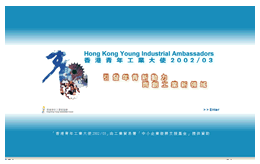Preparing for a career that jumps the border
The seminar was part of the Young Industrial Ambassadors roadshow exhibition held on the podium of the Amenities Building from 10-18 March. Two "industrial ambassadors", both successful entrepreneurs and recipients of the Council's Young Industrialists Award, were invited to share their professional insights on the new challenges faced by local industry. "No doubt, the production lines have moved northwards, but we also need local young talent in the fields of management, sales, design, and information technology. Hong Kong graduates should convince employers they have critical thinking skills and a passion to contribute to the growth of Hong Kong industry," said Mr Chan Wai Man, Managing Director of Jing Mei Industrial Ltd, a leading OEM manufacturer of automobiles, plumbing equipment, and electronics in Hong Kong. "Industry in Hong Kong should focus on its creative edge. We need designers with a broad knowledge base and a vision. Hong Kong university graduates are better than their mainland counterparts in this regard," said the other ambassador, Mr Boby Chan, Chairman and Managing Director of Moiselle International Holdings Ltd, a renowned ladies fashion manufacturer and retailer. Mr Chan has more than 20 years' experience in the garment industry. "In the long run, we want to train up a group of young people who were brought up in Hong Kong and who are willing to learn how a mainland factory is run. This group of people will have great potential to join our management team in the future," he added.
Mr James Leung, Senior Career Counsellor of CityU's Student Development Services (SDS) and coordinator of the seminar said, "Students interested in industrial positions are mainly from science and engineering disciplines. Their starting positions are mostly engineers or programmers. As more local enterprises expand their business across the border, students of other disciplines can also look for opportunities in human resources management, business management, and logistics." Mr Leung described the relocation of industrial plants northwards as a "monsoon trend" and said Hong Kong graduates should be realistic and prepared to work in the mainland. "We should not confine ourselves to Hong Kong. To understand the needs of the mainland market, the working style and strengths of our counterparts are the keys to success." He encouraged students to join more internship programmes in the mainland during their university years.
Since 2000, SDS has worked closely with departments/faculties in training students for placement schemes in the mainland. The Industrial Attachment Scheme launched by the Faculty of Science and Engineering (FSE) in 2000-2001, for example, is a cross-border scheme with student placements in plants in the Pearl River Delta region. Mr Leung is now responsible for training 400 second-year FSE students who have applied for a nine-week summer placement programme under the Scheme. With an average class size of 18 students, the two-day pre-attachment workshops cover presentation skills, the win-win concept, task management and advice on handling workplace issues. "Such necessary skills cannot be acquired overnight, but the training prepares students psychologically to work in real-life situations," said Mr Leung. Apart from training students for placement schemes initiated by faculties, the Career Centre of the SDS has also organized four mainland internship programmes since 2000. The Chongqing Internship Programme last January was successful in helping students understand the operation of private enterprises in China.
Students attending the industrial ambassador seminar were mainly from manufacturing engineering, electronic engineering, computer science, and business disciplines. Their enquiries covered such topics as job opportunities, taxation policies and language requirements related to working in the mainland. "I'm prepared to work in China, and how to upgrade myself to meet the challenge is my top concern," said a year-two computer science student. City University is the third stop in the Council's Young Industrial Ambassadors 2002-03 programme. With support from the Government's Small and Medium Enterprises Development Fund, it will stage a series of roadshow exhibitions and seminars in seven local universities from February to May. To help students learn more about the working environment in the mainland, the Council has organized a one-day visit to two electronics manufacturing factories in Panyu and Shenzhen on 22 March. About 40 CityU students have enrolled in the tour.





